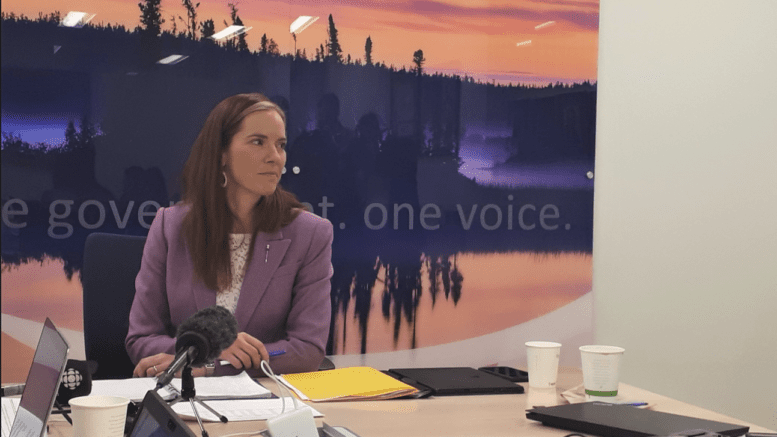There are few surprises in the GNWT’s 2023-24 budget.
Minister of Finance Caroline Wawzonek tabled the budget in the Legislative Assembly early Wednesday afternoon.
For the upcoming fiscal year, GNWT is projecting $2.48 billion in revenue and $2.31 billion in expenditures. This would result in an operating surplus of $178 million, thanks in large part to federal transfers. This is up from a projected $130.5 million and $39.7 million revised from the 2022-23 budget.
In speaking with the media Wednesday morning, Wawzonek described the budget as “being responsive and responsible at the same time.”
The territory continues to creep towards its $1.8 billion debt ceiling, with projected debt as of March 31 now standing at $1.49 billion. But it likely won’t reach that limit any time between now and 2026-27, contrary to previous estimates.
Nearly $24 million is being sunset from the department of Health and Social Services, including $11.6 million from ending the Covid Secretariat. Meanwhile, flood relief cost the Department of Municipal and Community Affairs nearly $62 million.
The budget has little in new funds for Indigenous languages and education: There is $19,000 in new territorial funding for the Indigenous Languages and Education Secretariat, and no change to the Canada NWT Cooperation Agreement for Indigenous Languages.
The budget also includes no new territorial investments in housing: In fact, the GNWT will contribute an estimated $82.5 million to Housing NWT this fiscal year, down $2 million from the previous year. But Crown-Indigenous relations and Northern Affairs Canada is once again contributing to Housing NWT, this time with a $30 million investment compared to $25 million in 2021-22. This means overall investment in the housing corporation is up this year.
Wawzonek explained this is an attempt on the part of the GNWT to be fiscally responsible. “Just throwing more money into the Housing Corporation to say, look, we’ve just thrown more money at them doesn’t necessarily mean we’re going to get better of delivery programs and services or improvements to their policies,” she said.
This is the first budget to be guided by a new set of rules designed to improve budgeting. Among these is a set of rules for private and Indigenous-owned firms competing for government contracts. As Deputy Finance Minister Bill MacKay explained, the objective is to give local and Indigenous-owned firms a better chance of accessing public contracts. “What we hear from Indigenous businesses especially is that it’s not working the way it should be in terms of building up Indigenous firm capacity to be able to respond to those contract callouts and to get a share of the work,” he said.
The capital budget will also be reset to $260 million each year in an effort to “restore reality” to the budget, according to the GNWT.
This is the last budget of the 19th assembly.







